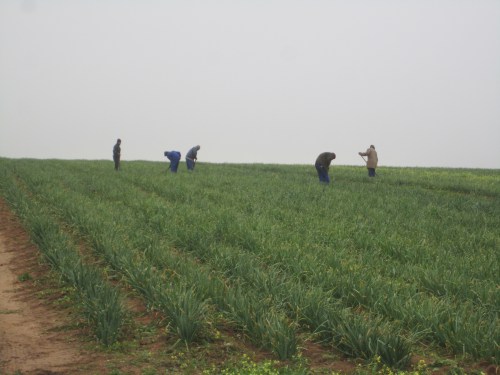Are You A Producer Or A Marketer
As I’ve written before, I have had a couple of tries at farming, and I am at it once more. Each time I return to farming with a new strategy on how to succeed at it, strategies that are borrowed from the business world where I usually am at when I am not at the farm. This time round, my big 3 word strategy when I went back to farming was “supply chain efficiency”.
I had observed that farmers do not own the supply chain for their produce and for that reason end up selling their produce at throw away prices to brokers. This is an extremely inefficient system because the brokers then sell their produce to other brokers at the market who then sell to retailers at the market, who then sell to the kiosk venders who finally sell to us the consumers. By the time the produce gets on our tables, it is over 6 times the price it was sold at at the farm. This irked me because both the farmer and the consumer are getting a raw deal. I was determined to do things differently to get better prices for the farmer, but also better prices for the end user, and I tried a couple of models to fix this:
My first model was to grow a couple of food items that we consume daily like kales, onions and tomatoes, and to deliver them directly to consumers. I thought of weekly vegetable baskets priced according to size. This model died in the planning phase. When scanning the competition, I realized that many people in the business were buying their produce from the market, and were therefore able to supply greater variety than I could farm and supply. To fix this, I would have to complement my farm produce with items from the market. I had two problems with this: First, I didn’t have the time to shop at the market in addition to farming and an office job, and secondly, my selling point was going to be “farm to fork” guarantee; I could not guarantee this for produce bought from the market, so I abandoned this. That is not to say it is not a viable strategy. It could still work, and as I widen the scope of the crops I can farm all year round, I probably will test it.
My second attempt at “supply chain efficiency” was spurred by a broker who bought my watermelons at the farm at a throw away price. It is really painful to sell produce you have struggled to grow at a terrible price, so I tried to cut out at least one broker and take my watermelons to the market myself. A friend linked me up with someone at the market who could assist me to sell to a broker in the market, and on a cold drizzly Saturday morning, I loaded my best quality watermelon and went to “Marikiti”, the farmer’s market. I did manage to sell the watermelon at a slightly higher price than the broker would have bought at the farm, but I hated the experience for two reasons; first I had to pay the guy who linked me up with a buyer, and his fee was pegged on the number of kgs I sold. I didn’t see what he had done to earn that much money. Secondly, I hated seeing my broker then sell my watermelon to market retailers at more than double the price he was buying from me. He did this as we weighed, so by the time I left the market, he had finished selling and closed shop!
Many farmers have happily sold their produce at the farm gate, via brokers or directly to retailers, but one thing I realized then was that my joy is in producing, not selling. In the last instance where I made a little more money, I still went home feeling frazzled by all the haggling, and unhappy that the consumer was still going to get a raw deal. I realized that for now, I needed to decide whether I am a producer, or a marketer.
I then decided to focus on mastering production. I needed to find a reliable buyer whose interests were aligned to mine, and who could give me a relatively stable and fair price for my produce, and I would then focus on producing maximum quantities for them. With that in mind, I abandoned watermelon farming (for now), and got two, all-year round contracts, one to produce French Beans and baby corn, and a second one to produce grain amaranth. The advantage of this is that is that the selling price is fair and is set at the beginning of the year, leaving me to focus on producing as much as I can. I am also in discussions with a groceries supplier who wants to give me a contract for a variety of products. This will increase my mastery of production even more.
When you decide to go into agribusiness, decide where to start off at. You cannot be an expert farmer and an expert marketer from the start. Build your competence in production, maximise that, then start conquering the animal that is marketing. I still believe I will fix the agriculture supply chain. I do not think it is right for me to sell watermelon at 20 bob per kg at the farm, then buy it at 105 bob per kg in the supermarket. However, I realize that this is not the time for that. This is my time to master production, and produce the best quality food at the lowest cost possible.




5 Comments